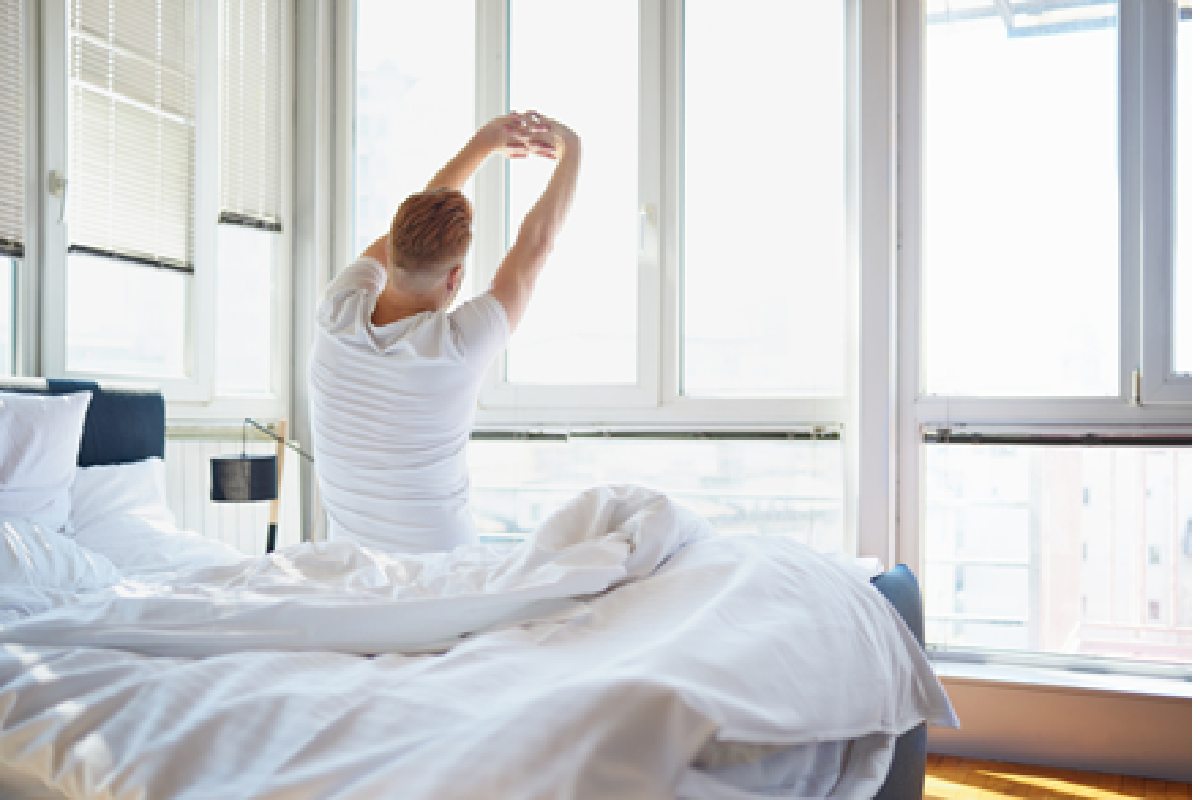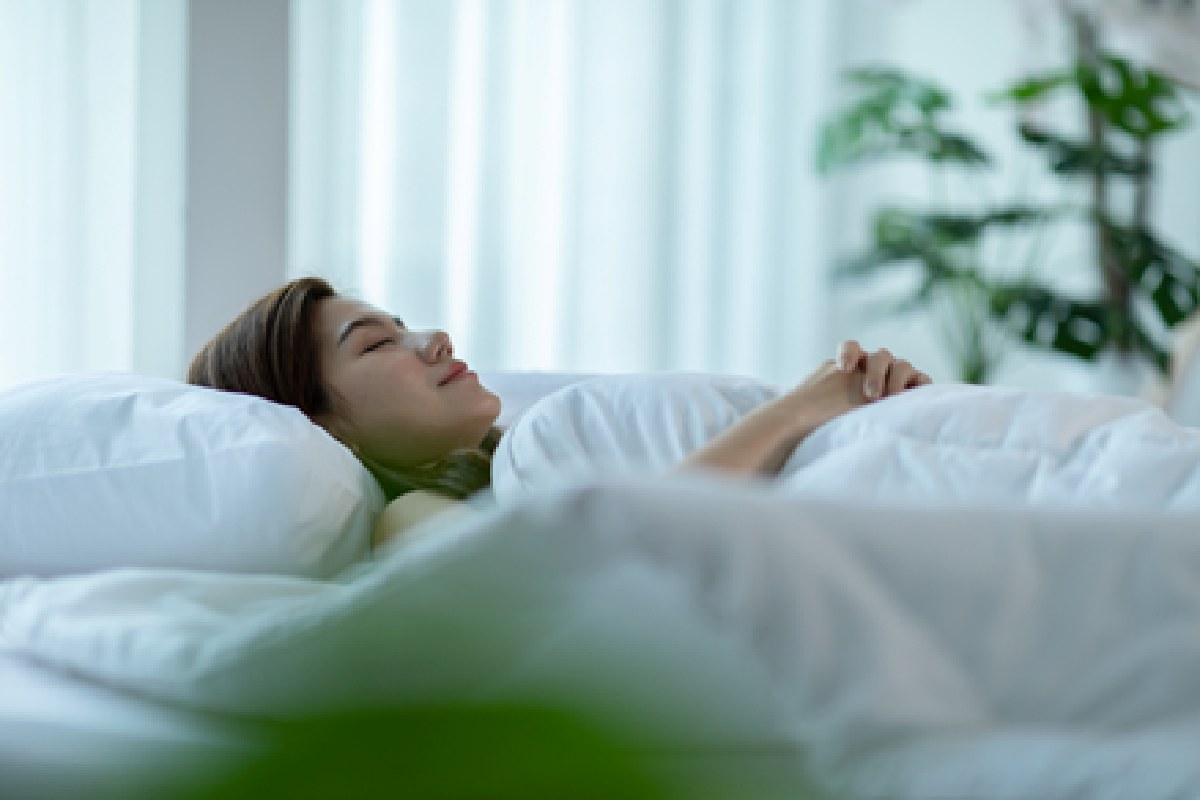Sleeping in on the Weekend – Chances are, even if you’re a so-called morning person, you’ve probably experienced the joy of sleeping in late on the weekend. Maybe you had a late night out and wanted to catch up on some much-needed sleep. Or perhaps you slept with a weighted blanket for the first time and couldn’t bring yourself to leave your soothing cocoon at your usual wake-up time. (Trust us, we’ve all been there.)
In any case, you know just how amazing it feels to hit the snooze button on a lazy weekend. But have you ever wondered if sleeping in late is actually good for you? While most sleep experts agree that catching up on sleep is generally a good thing, studies show that there could be some downsides to sleeping in late. Read it for everything you need to know before your next weekend snooze fest.

Is Sleeping in on the Weekend Good for You?
For the most part, yes. Scientific research makes it clear that sleep is an essential part of a person’s overall health and that getting too little can increase the risk of certain medical conditions such as obesity, heart disease and high blood pressure.
According to National Sleep Foundation, the average person should aim for seven to nine hours per night, but more than one-third of us aren’t getting the sleep we need. Common reasons for this include stress, shift work, sleep disorders and lack of a restful sleep environment.
Sleeping in on the weekends allows us to make up our sleep debt, a term used to describe the difference between the amount of sleep a person needs and how much they actually get. For example, if you need to wake up early on a Friday, you can make up for lost sleep by sleeping in the next day.
Although it may sound like wishful thinking, research suggests that sleep debt can be repaid. In a 2018 study published in the Journal of Sleep, researchers collected data from 43,880 people over a 13-year period. Unsurprisingly, they found that people who slept less than five hours each night during the week had an increased risk of early death compared to those who slept for six or seven. However, researchers also found that people who got less than five hours of sleep during the week had a lower risk of an early death when they slept in on the weekend. This suggests that you can technically “catch up” on sleep.
Potential Drawbacks of Sleeping in on the Weekend

There’s no denying that sleeping in on the weekends feels good, especially when you’re sleep deprived. But if you think that hitting the snooze button every weekend is a healthy fix for your sleep-deprived schedule during the week, think again.
While sleeping in on the weekend can help you make up for any missed sleep during the week, it’s not nearly as beneficial as getting the sleep you need in the first place. According to a 2016 study published in Scientific Reports, it takes your body a full four days to recover from only one hour of missed sleep.
Let’s quickly do the math: If you have a sleep debt of four hours, that means it would take you 16 days to fully recover.
The bottom line? Catching up on sleep can be helpful, but it’s not a substitute for getting the daily sleep you need.
Tips for Making Up for Lost Sleep

Making up for lost sleep may not be as good as getting the seven to nine hours you need every day, but that doesn’t mean you shouldn’t try to pay off some of your sleep debt. If you had a late night during the week, here are a few tips for making it up on the weekend:
- Keep it quiet. Nothing ruins a weekend snooze fest more than the sound of traffic, barking dogs and your family banging pots and pans in the kitchen. For an undisturbed slumber, consider using ear plugs or a white noise machine to drown out the noise.
- Block out the light. If you need to sleep past 6 a.m. in the summer, blocking out light is a must. Blackout curtains and blinds block morning light and come with the added benefit of reducing energy costs in the summer. If blackout curtains are too expensive, you can also use a weighted sleep mask to catch up on your slumber. Sleep masks are particularly helpful for people who travel frequently or those who enjoy the occasional power nap.
- Consider taking a nap instead. Speaking of naps, you may be better off waking up at your usual time and opting for a mid-day doze instead. Why? Because changing up your sleep pattern on the weekends can cause “social jetlag,” which makes you feel fatigued and tired. Try incorporating a quick nap (under 20 minutes) into your weekend schedule. It may not be as moral as getting an extra two hours in the morning, but it adds up over time!
- Go to bed earlier. Hitting the sack a little earlier than normal can help you catch up on sleep. Of course, this may be easier said than done. If you struggle to fall asleep at an earlier bedtime, try a few sleep-inducing activities — like reading a book or pampering yourself before bed.
- Tell your roommates/family about your sleep-in plans. When you sleep later than normal, your family members may come in to check on you to make sure everything’s alright. Let them know about your plan to sleep-in the night before so you can get undisturbed sleep. Similarly, if you have noisy roommates, give them a heads up so they know to be quiet in the morning.
Sleeping in on the weekend is a great way to catch up on your shut-eye. Still, most experts agree that keeping a consistent sleep schedule is the best way to go. For optimal health and well-being, practice good sleep hygiene as much as possible and limit your weekend catch-ups.

